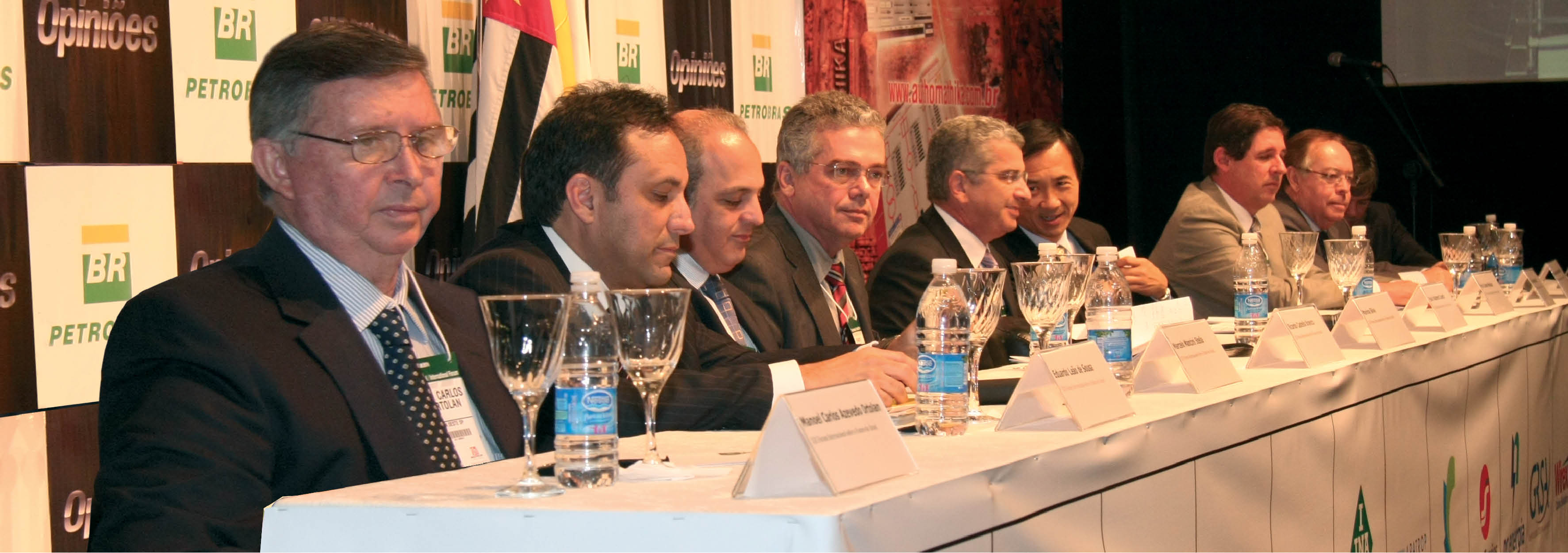Ricardo Castello Branco
Director of Ethanol of Petrobras Biocombustíveis
Op-AA-26
Petrobras and biofuels
Biofuels are one of the pillars of the Petrobras’ business, along with the exploration of oil and gas, the supply and distribution of derivative products, the marketing of oil and gas, and its petrochemical business. The strategy for biofuels is to perform in Brazil and abroad in a manner integrated with the Petrobras system, using the advantages the company has as a producer – through Petrobras Biocombustíveis –, and through its distributor of fuels – BR Distribuidora –, as well as through its strong global presence in the marketing of fuels, and to an ever growing extent, of biofuels.
Petrobras’ business plan for biofuels foresees continued growth of production, seeking to integrate oil and derivative products. In the next five years, Petrobras will invest US$ 224 billion, of which US$ 3.5 billion (1.56%) have been earmarked for biofuels, divided into US$ 2 billion for ethanol production, US$ 400 million for research and development of new technology, and US$ 700 million for logistics.
We have an ambitious production growth target. In 2014 we will be involved in the production of 2.6 million cubic meters of ethanol per year. Petrobras Biocombustíveis was created in 2008. We participate in, or operate, 14 biofuel production units throughout the country, four of which produce biodiesel and 10 that produce ethanol. We started ethanol production last year in partnership with Total, in the State of Minas Gerais (MG).
This year, we announced the partnership with the Tereos Group, in the Guarani organization, which currently operates seven units in the State of São Paulo (SP), one in Mozambique and another partnership with São Martinho in the Nova Fronteira mill in the State of Goiás (GO). These installations crush 24 million tons of sugarcane, producing 900,000m3 of ethanol.
Said growth in production will result from these companies with which we have partnerships. In its logistics operation, Petrobras has a 33% share in the company PMCC (whose owners are Petrobras, Mitsui and Camargo Corrêa), established to develop a logistics project for ethanol to be transported through pipelines, linking the Midwest to the coast in the Southeast, covering a distance of almost 1,000 kilometers. The system foresees a pipeline from Uberaba-MG to Paulínea-SP.
This pipeline is in the phase of obtaining the required licenses, with construction start-up scheduled to begin still in 2010. In another system, Transpetro, our transportation subsidiary, is currently in the bidding phase for the acquisition of barges for transportation on the Tietê-Paraná waterway, linking Aparecida do Taboado-MS to Santa Maria da Serra-SP, and from there through pipelines to Paulínia-SP.
Then, from Paulínia, through an existing system, to the terminals at Ilha D´Agua and São Sebastião, on the coast of the State of São Paulo. Investments in transportation logistics, whether onshore or in oceangoing vessels, is essential to make ethanol a global commodity.
In relation to the Brazilian energy matrix, the sugarcane system is already by far the country’s second primary energy source, with an 18% share, which, added to the 15% of hydric energy, the 10% generated from biomass, and the 4% from other sources, totals 47% of Brazil’s consumption from renewable sources, compared with an average of 19% worldwide, and 7% in OECD – the organisation formed by the richest countries in the world.
According to Petrobras studies (confidential until this year), the global demand for energy between now and 2030 is projected to grow 1.30% to 1.32% per year, resulting in that we will move from the current 12.974 million tons of oil equivalent per year to between 17.236 and 17.324, regardless of whether the current scenario continues or if the trend will be towards low carbon fuels.
Each item would be thus represented: oil is expected to decrease from 33% to between 28-29%; gas is expected to remain at 22%; coal may grow from 26% to between 28-29%; nuclear energy is expected to remain at 6%; hydric energy may grow from 6% to 7%; other renewable sources are expected to grow from currently 0.5%, to 2%; traditional biomass is expected to remain at 7%, and biofuels will increase from currently 0.4% to around 1%.
To reach this level, biofuels are expected to grow at an annual rate between 5.2% and 6.1%, reaching a figure of about 12 times the current production. Unlike what it seems to be, it is a huge market the size of almost twice the current Brazilian oil production. According to Petrobras consultants, there are some limiting factors for the growth of the ethanol market.
The main competitors are: the increase in energy efficiency, hybrid vehicles, hybrid electric vehicles and battery-powered vehicles.
In practice, the three major growth obstacles are: supply safety, the existence of a market with few exporting countries and issues related to sustainability. Be it said that, with respect to oil price projections in this 20-year period, still according to the consultants, prices may exceed US$ 100 around 2020 and US$ 130 in subsequent years.
Petrobras is assuming scenarios with more conservative figures, projecting investments with positive ROIs in all scenarios, while already taking into consideration significant production cost increases and growth in consumption, particularly in China and India. In projecting considerable growth for ethanol in global terms, Petrobras is making major investments in technology based on a well defined strategy.
We are working a threeprong approach: Expanding the limits of current production (involving new raw materials); productivity of cultures and production techniques, as well as raw material logistics; use of residues as raw materials both in the enzymatic and bio-oil approaches, including biorefineries in the latter.
Another important approach is aggregation of value and product diversification – diesel production from sugar; biofuels for jet aircraft involving high quality standards and a huge market; ethanol for diesel engines with an eye on Europe; the approach to ethanol-based chemistry and the production of biodegradable plastic. The third prong is the issue of sustainability.
These issues are important, given that they may hinder all undertaken efforts from bouncing back from non-tariff barriers. As related to lignocellulosic ethanol in the biochemical approach, a process many are betting on, for three years already Petrobras has been operating a pilot plant in our Research Center, and next year the company will start up a prototype plant. Rather than kilos we will produce tons per day.
With the intent of accelerating this process, we last week announced a partnership with a U.S. company that already operates a plant that produces 30-40 tons per day from wood residues. We will adapt the process for the use of sugarcane bagasse. If we succeed, we plan to install a plant as an annex to our partners’ installations, as soon as 2013.
We must keep a close eye on the issue of sustainability. We must make sure that our ethanol is sustainable. We must create and implement evaluation tools throughout the process – it does no good to control the production process and yet transport ethanol by truck over a distance of 2,000 kilometers. That would eliminate any gains achieved. We must operate based on sustainable logistics.
Essential issues are the energy balance, pollutant emissions in industrial and agricultural processes, the use of water, impact on water bodies and soil. Apart from the impact on the ecosystem, biodiversity, use of natural resources, we must also consider social issues, labor, safety and health conditions of the workforce and even the impact on the production of food. We must fundament the logical issues and do away with fantasies.
Finally, to face the challenges of the internationalization of ethanol, we must develop differentiating technologies to increase production efficiency; a system to verify sustainability during life cycles; we must help to diversify supply sources, given that one cannot set up an international commodity with only one supplier country.
Therefore, it is necessary to foster new supply sources in countries suited for this culture, particularly countries in Africa and South America, providing importers supply options; the development of logistics systems is essential, which must be compatible with the logistics of fuels; the issue of harmonizing technical specifications, essential in preventing non-tariff barriers; and lastly, to deal with the issue of the internalization of the cost associated with carbon emissions inherent to fossil fuels.





